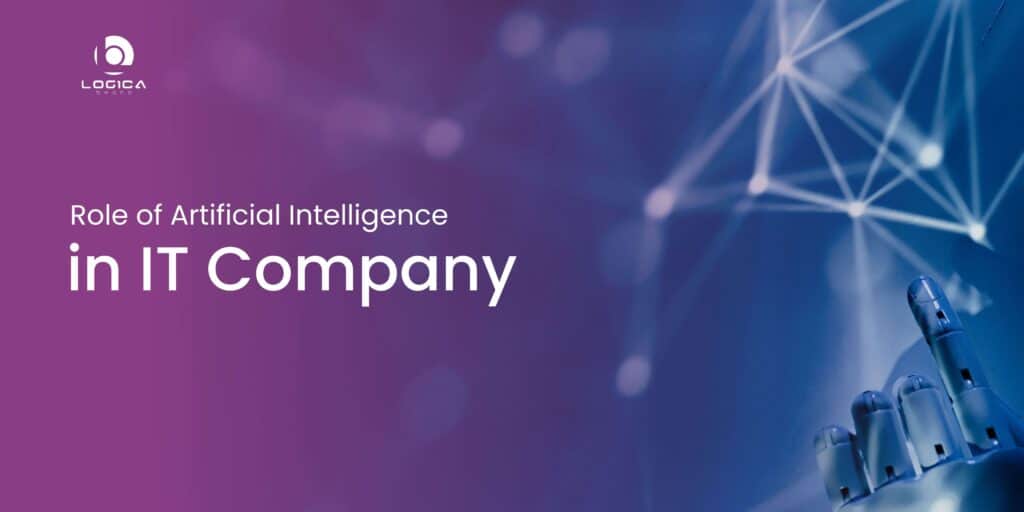Imagine a future in which technology is continually changing and modifying every element of our life. The information technology (IT) industry is at the forefront of innovation in this quickly changing world, embracing the cutting-edge technology such as Artificial Intelligence to fulfill the ever-increasing demands of organizations and individuals. Artificial intelligence in IT company has become a vital tool for trying to optimize processes, improve customer experiences, and offer better outcomes, from intelligent automation to predictive analytics.
Since its beginnings, artificial intelligence has gone a long way, and its incorporation into numerous sectors has resulted in substantial advancements. Yet, AI’s impact on the IT industry has been particularly noteworthy. Artificial intelligence in IT company has enabled IT organizations to streamline their operations and develop creative solutions, which has helped them preserve their competitive advantage.
In this blog, we will take a deeper look about the ever-growing AI, its advantages and disadvantage in IT company and also how it works.
Artificial intelligence in IT company and its key features
The replication of human intellect in robots that are built to think and learn like humans is referred to as artificial intelligence (AI). AI technologies allow machines to process and analyze massive volumes of data, identify patterns, and make decisions based on that data. AI is being applied in a variety of industries, with the information technology (IT) sector being one of the early adopters.
In the recent context it is seen that AI has been used mostly by the IT or software companies for a number of objectives, including intelligent automation, predictive analytics, and customer service. Artificial intelligence in IT company can assist in streamlining operations and increasing productivity, whereas predictive analytics help businesses to make data-driven choices, forecast future trends, and spot possible problems before they occur. Moreover, AI powered chatbots are utilized for customer care, assisting businesses in providing rapid and effective support to their clients.
Machine learning, natural language processing, and computer vision are some of the most important aspects of AI. Machine learning is one of the subsections of AI that focuses on building methods that allows machines to learn data without being explicitly programmed. Natural language processing refers to the computers’ capacity to comprehend and interpret human language, whereas computer vision refers to the machine’s ability to identify and interpret visual input.
AI is a revolutionary technology that is reshaping the IT sector. Its primary capabilities, including machine learning, natural language processing, and computer vision, enable IT organizations to automate processes, make data-driven choices, and deliver superior customer support. As AI in IT company advances, it will surely open up new opportunities for the IT business and other industries.
Benefits of AI in IT company: How can AI help IT companies to be more efficient and effective?
Driving revolutionary initiatives while dealing with the consequences of the old infrastructure presents the IT sector with a challenging balancing act. In order to improve IT operations management and speed up problem resolution in complex contemporary IT environments, IT is forced to hunt for the most efficient solutions as IT infrastructures get more complex and customers become more sophisticated. The vast, dynamic, and challenging-to-manage IT ecosystem has found a perfect use for AI, the incredible advancement.
AI offers a wide range of benefits including increased productivity and efficiency across the board. Here are some of the benefits of AI in IT companies which can help the company to be more efficient and effective.
1. Task automation
Task automation is one of the key advantages of AI for IT organizations since it can eliminate repetitive and time-consuming jobs. AI, for instance, can assist in automating software testing, which is performing a series of predetermined tests to make sure the product works as intended. IT businesses can accelerate the testing process, lower the chance of mistakes, and raise the overall caliber of their product by automating this process.
2. Predictive maintenance
Predictive maintenance is another method AI can assist IT organizations in being more successful and efficient. Predictive maintenance is the process of analyzing data to foresee when hardware or software can malfunction, allowing repair to be planned proactively to save downtime. An IT corporation, for instance, can use AI to keep track of its servers and forecast when they might malfunction based on use trends, network traffic, and temperature. The business can prevent unplanned downtime, lower the risk of data loss, and ultimately save time and money via proactive maintenance planning.
3. Cybersecurity
AI can also help IT firms increase their cybersecurity. AI can, for instance, be used to instantly identify and stop cyberattacks. AI can warn IT professionals to take action before any harm is done by monitoring network data and seeing trends that can suggest an attack. With AI, it is also possible to examine records and spot potential security risks like unauthorized access attempts or strange activities.
4. Personalized customer experience
Artificial intelligence in IT company customizes client experiences. AI can be used, for instance, to evaluate consumer data and offer tailored suggestions for goods and services based on customers’ tastes and behavior. Increased client happiness, improved retention rates, and eventually more income for the business are all possible results of this.
5. Natural language processing
Artificial intelligence can be used to enhance natural language processing, a computer’s capacity to comprehend and interpret spoken language. This can be very helpful for customer care and assistance for IT businesses. AI-powered chatbots can be used to respond to frequent client queries, fix problems, and offer help around-the-clock. This might lessen the strain for the IT workers and raise client satisfaction.
6. Better resource allocation
Within an IT organization, AI can be utilized to optimize resource allocation. AI, for instance, can examine employee workload and performance data to pinpoint areas that require more resources. This can assist the business in allocating resources more wisely, lowering the danger of burnout and raising general productivity.
7. Increased innovation
By offering fresh perspectives and facilitating the creation of new goods and services, AI can assist IT firms in fostering innovation. AI can be used, for instance, to spot upcoming technologies and trends that the business might exploit to enhance its products. This might help the business expand and maintain an edge over rivals.
Challenges of artificial intelligence in IT company: What are the potential risks associated with artificial intelligence?
Artificial intelligence has the revolutionized the way we live and work, but it also presents number of potential risks and challenges. Here are some of the challenges that are associated with AI in IT company.
● Partiality
One of the key risks associated with AI is partiality. If AI systems are educated on biased data, they can develop prejudice and produce unfair or discriminating results. It is crucial to make sure that the data utilized to train AI systems is varied and reflective of the community it is meant to serve in order to reduce this risk. This means that data sets should be carefully examined for any biases that they could have, and any detected biases should be addressed.
● Privacy and Security
Access to vast volumes of personal data is frequently required by AI systems, which poses a privacy and security concern. It is crucial that IT businesses take precautions to safeguard sensitive data, such as access rules, encryption, and routine security audits. Companies should also get express user consent when necessary and be open about how they gather and utilize personal data.
● Regulation
Regulation is becoming necessary as AI becomes more pervasive in IT in order to ensure ethical use and stop abuses. This means that IT businesses must set clear rules for the ethical use of AI and be aware of pertinent laws and regulations. Businesses should guarantee that they are accountable for any bad effects that their AI systems can have by being clear about how they work.
● Technical Restrictions
AI technology is still in its infancy, and it still has several restrictions that might affect how accurate and efficient it is. Before deploying their AI systems, IT organizations should make sure they have a thorough grasp of their capabilities and constraints. They should also make sure that the systems have been adequately tested and verified. As a result, businesses should be ready to spend money developing and testing their AI systems before using them.
● Job displacement
Job displacement can result from the automation of several jobs by AI. To counteract this, IT organizations should invest in reskilling and upskilling their staff for new positions that call for human abilities that are less likely to be automated, such creativity and problem-solving. This indicates that businesses should take the initiative to get their staff ready for the changes that AI is expected to bring.
Although there are numerous potential hazards and difficulties associated with AI, they can be reduced with good design and execution. This means that IT firms must be conscious of the dangers posed by AI and take appropriate, morally sound action to mitigate them. By doing this, businesses can guarantee the efficiency, accuracy, and fairness of their AI systems while also preserving the security and privacy of their consumers.
Future of AI in IT
In the upcoming years, it is anticipated that AI in IT company will be quickly developed and would have a significant influence on almost every business. The following are some of the most important trends and advancements that will probably influence the direction of AI:
● Advancements in machine learning
A form of AI called machine learning involves teaching algorithms to learn from data. Machine learning algorithms are growing more complex and precise as more and more data is produced. This is anticipated to result in even more precise forecasts and insights in the future, which will have important repercussions for sectors including healthcare, finance, and marketing.
● Increased Automation
AI is already being used to automate a variety of jobs, including data processing and customer care. As AI systems advance and improve, we can anticipate seeing even more chores automated in the future. Human employees will be able to concentrate on more imaginative and strategic tasks as a result, which will probably result in major gains in productivity and efficiency.
● More Personalized Experiences
AI is already being used to customize services like product suggestions and customer support. As AI systems improve in analyzing and deciphering data about specific users, we can anticipate even more individualized services and goods in the future. Due to the ability for businesses to customize their offers for specific clients, this will have profound effects on sectors like marketing and e-commerce.
● Ongoing Development in Robotics
Robotics is another field that is anticipated to expand rapidly in the upcoming years. Robots will be even more capable of completing activities that were previously thought to be too risky or difficult for humans to complete as AI and other technologies advance. Healthcare, construction, and other sectors including manufacturing will all be significantly impacted by this.
● Increasing Human-AI Collaboration
As AI systems advance in sophistication, they will be able to collaborate more closely with human employees. This partnership will probably change several sectors and help businesses operate more successfully and efficiently. For instance, AI might be used in the healthcare sector to assist doctors in making more accurate illness diagnoses, and in the financial sector to assist investment experts in making wiser choices.
Artificial intelligence in IT company holds both opportunity and uncertainty. Further progress in machine learning, greater automation, and more individualized experiences are to be anticipated in IT industry. The influence of AI on our lives is going to be tremendous since it has the ability to revolutionize almost every industry, from manufacturing to healthcare. Yet as AI spreads, there will also be questions about the moral ramifications of its use and the necessity for laws to assure its proper and moral usage. Nonetheless, it is evident that the future of AI in IT company is brimming with chances for creativity.
Conclusion
AI in IT company is not just limited to automating dull tasks or providing analytical insights. The potential for AI to improve decision-making, change corporate processes, and open up new possibilities is enormous. We can anticipate more developments in AI technology in the future, leading to systems that are increasingly smarter and more powerful.
The potential advantages of this technology are evidently too great to ignore, despite the fact that the risks and issues connected with AI must be handled. The future is full with exciting opportunities for innovation and progress for people who want to pursue professions in IT and AI.










